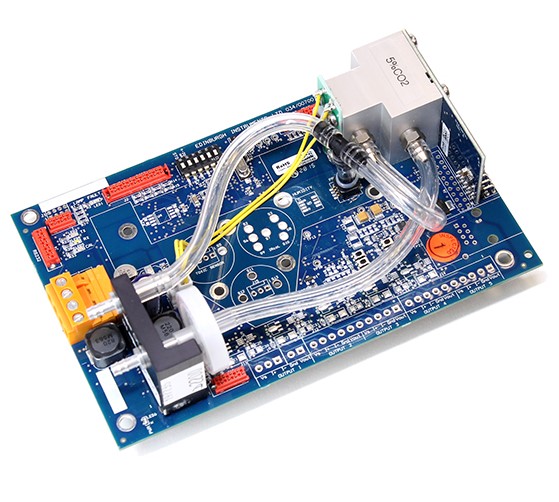Carbon Dioxide Monitors for Schools

Carbon dioxide (CO2) monitors are becoming increasingly popular in schools as a way to ensure a safe and healthy learning environment.
In 2021, the UK government invested £25 million into carbon dioxide monitors for schools, to improve the indoor air quality and CO2 levels in classrooms that affects the health and safety of staff and pupils.1 In September of 2021, state-funded schools were provided with carbon dioxide monitors1; since then, there has been an increase in indoor air quality monitor installations, not just in schools but further industries, including leisure centers and restaurants.2 This push for indoor air quality measurement has largely stemmed from the Covid-19 pandemic as more discussion around air ventilation was being had.
People have since become more aware that exposure to excessive levels of CO2, due to insufficient airflow, can result in the spread of airborne viruses and other health problems, such as drowsiness, headaches, and more. In this article, we discuss the introduction of carbon dioxide monitors for schools and how they help maintain safe CO2 levels in classrooms to improve the indoor air quality in schools.
CO2 Monitors for Schools Indoor Air Quality
Safe CO2 levels can be achieved indoors through heating, ventilation, and air conditioning (HVAC) systems that control the indoor environmental conditions such a temperature and air quality. However, HVAC systems need careful gas monitoring to fully manage the indoor air quality. Integrating a CO2 Sensor into a HVAC system will measure indoor air quality and carbon dioxide levels and allow for HVAC systems to be used adequately. Having an indoor air quality measurement system allows those indoors to act quickly when ventilation is poor, taking measures such as opening doors and windows to provide improved ventilation.
To learn more about HVAC read out previous article that covers the topic in more detail: Indoor Air Quality Testing for HVAC.

Schools and educational institutions should ensure they are providing a safe and comfortable learning and work environment for both their students and staff. When we breathe out, we produce CO2, which can quickly accumulate in busy, poorly ventilated rooms and buildings. Excess levels of CO2 within an enclosed space is known to be dangerous to the health of those within, linked to issues such as the spread of airborne viruses, drowsiness, headaches, increased heart rates, and more.2 Previous studies have shown that high levels of CO2 can additionally reduce humans’ cognitive abilities, worsening memory, weakening concentration, and affecting the ability to think.3 Integrating HVAC monitoring systems and using CO2 monitors in schools will mean staff can maintain acceptable CO2 levels in classrooms and provide a healthy classroom environment. Improved CO2 levels will then not only improve wellbeing but overall student and staff performance.
Carbon Dioxide Monitors for Schools Paving the Way for Budget Savings

Indoor air quality measurement within a building can provide information on its occupancy and allow organisations to operate more efficiently. As CO2 levels rise when rooms are busy, indoor air quality measurement will provide information on occupancy. This can then be used to review the use of the buildings heating, air conditioning (HVAC) to fit with the patterns of occupancy. One study by The University of Alabama found that businesses could save from 20-40% on their bills by monitoring their occupancy levels.3
Safe Levels of CO2 in a Classroom: Monitoring Schools Air Quality

Research suggests that CO2 levels in classrooms should be below 800ppm.1 HVAC Sensors allows staff to observe and improve the classroom environment and schools air quality, guaranteeing safe CO2 levels. Providing acceptable CO2 levels in schools and classrooms and a comfortable indoor air quality is no longer optional. Educational institutions now have an important duty of care to monitor their schools indoor air quality and ensure safe CO2 levels indoors.
CO2 Monitors for Schools from Edinburgh Sensors
Edinburgh Sensors offers a reliable and accurate carbon dioxide monitor for schools.
In order to manage the CO2 levels in schools and classrooms, you must have a reliable carbon dioxide monitoring system integrated within a buildings HVAC system.
For HVAC systems, Edinburgh Sensors Gascard NG is an easy to install, low maintenance sensor that can be connected to remote data logging or control systems. The Gascard NG is perfect for gas monitoring for environmental optimisation and safety.
Edinburgh Sensor’s Gascard NG is a Non-Dispersive Infrared (NDIR) sensor with excellent accuracy and sensitivity, capable of detecting CO2 concentrations over a series of different ranges.

Get in Touch
If you have any questions about CO2 monitors for schools, please get in touch and a member of our team will be delighted to help.
Additionally, if you have enjoyed this article and wish to stay up to date on the latest news from Edinburgh Sensors, sign-up to our infrequent newsletter, or follow us on social media – LinkedIn, Facebook, and Twitter.
References
- https://www.gov.uk/government/news/all-schools-to-receive-carbon-dioxide-monitors
- https://gasmonitor-point.co.uk/news/monitoring-co2-levels-in-schools/
- https://www.airthings.com/business/resources/carbon-dioxide-co2-schools-education#:~:text=Why%20does%20carbon%20dioxide%20in%20schools%20and%20educational,low%20carbon%20dioxide%20environments.%203%20Operational%20efficiency.%20

